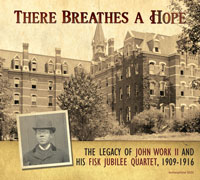In today’s “Sightings” column for The Wall Street Journal, I write about Archeophone Records’ There Breathes a Hope: The Legacy of John Work II and His Fisk Jubilee Quartet, 1909-1916. Here’s an excerpt.
* * *
Century-old records are the closest thing we have to a time machine. To listen to the voice of Theodore Roosevelt or the piano playing of Claude Debussy is to feel the years falling away like autumn leaves from a maple tree. Rarely, though, have I been so engrossed by an album remastered from antique 78s as I was by “There Breathes a Hope: The Legacy of John Work II and His Fisk Jubilee Quartet, 1909-1916,” an anthology released by Archeophone Records. This two-CD set, which also includes a profusely illustrated 100-page booklet, contains 43 of the first recordings of black spirituals. It is the most important historical reissue of 2010–and one that tells a story about turn-of-the-century black culture that may make some listeners squirm with retrospective discomfort.
 Nashville’s Fisk University, which opened its doors in 1866, is one of America’s oldest historically black colleges. It is also known to scholars of American music as the home of the Fisk Jubilee Singers, an ensemble founded in 1871 that introduced concertgoers around the world to such deathless songs of sorrow and hope as “There Is a Balm in Gilead” and “Roll Jordan Roll,” in the process raising hundreds of thousands of dollars for the inadequately funded school. The original Fisk Jubilee Singers disbanded before the invention of the phonograph, but in 1899 John Work II, a teacher at Fisk, reorganized the group, and a male quartet drawn from the chorus started making recordings for the Victor Talking Machine Company in 1909.
Nashville’s Fisk University, which opened its doors in 1866, is one of America’s oldest historically black colleges. It is also known to scholars of American music as the home of the Fisk Jubilee Singers, an ensemble founded in 1871 that introduced concertgoers around the world to such deathless songs of sorrow and hope as “There Is a Balm in Gilead” and “Roll Jordan Roll,” in the process raising hundreds of thousands of dollars for the inadequately funded school. The original Fisk Jubilee Singers disbanded before the invention of the phonograph, but in 1899 John Work II, a teacher at Fisk, reorganized the group, and a male quartet drawn from the chorus started making recordings for the Victor Talking Machine Company in 1909.
No matter how much you think you know about spirituals, I think you’ll be surprised to hear these performances, because few of them sound anything like what you’re likely to be expecting. Their musical tone is formal, sometimes even a bit staid, as if you were hearing four gentlemen in high-button shoes warbling close-harmony hymns in the parlor. Not always–the quartet tosses off the syncopations in the up-tempo tunes with a light, dancing touch–but it’s downright startling to hear them sing “CHAH-ree-AHT” in the very first recording of “Swing Low, Sweet Chariot.” No less surprising is that they recorded “Old Black Joe,” one of Stephen Foster’s nostalgic plantation songs, at their third session….
* * *
Read the whole thing here.
Terry Teachout on the arts in New York City
An ArtsJournal Blog
